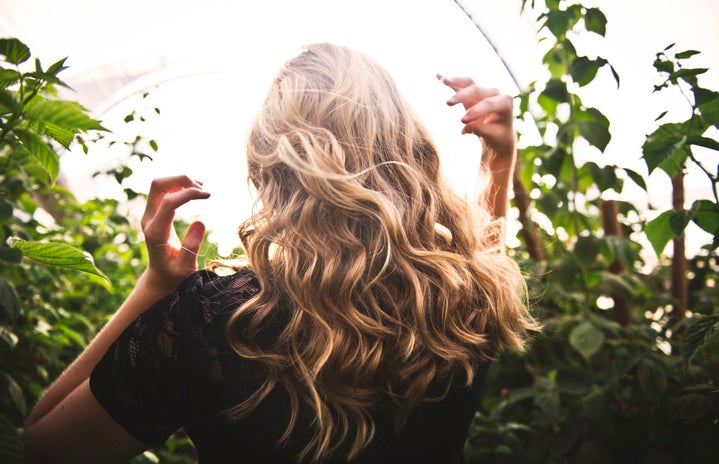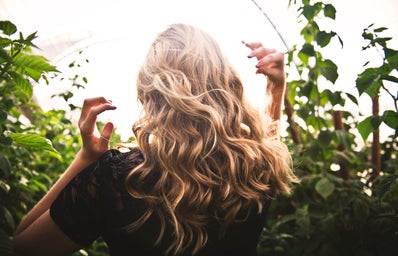This article is written by a student writer from the Her Campus at Chatham chapter.
When I first heard about the “big chop,” I was speechless. My sister was home from her HBCU for the summer when I was a high school sophomore and was telling me about her experiences. One of which was this concept of “going natural,” a new way of being among the black community. I had never heard of a life free of relaxers and waking up every day to flat iron my hair as straight as possible. Granted, my mother hadn’t gotten a perm in years to preserve her highlights, and my eldest sister was taking a break from chemicals after a salon mishap. But when my sister told me that women were willingly cutting off all of their hair to have a fresh start, I think I said something along the lines of “well that sounds awful.”
It wasn’t until the summer before my senior year of high school that I even considered going natural at all. It wasn’t because of self-love or because I was down with my blackness. It was because I knew college was coming up fast and I wouldn’t be able to continue getting relaxers. So I stopped getting relaxers, a period I soon learned was called “transitioning.” I didn’t do much to my hair anyway, but this was a whole new level of not knowing what I was doing. It all got crazy after my third wash or so. My hair was frizzy and hard to straighten, so like any person would do; I wore a bun or a hat. If I wasn’t in my house, my hair was pulled back and hidden away. I barely saw my hair during that winter. And the one time I tried a transitioning hairstyle from Pinterest, the infamous twist-out, it only lasted for hours and fell apart while I was at work, forcing me to go from hot mess to hot mess in a ponytail. I finally couldn’t take it anymore, and I started doing research. I was about six months in and I still didn’t know anything about being natural. All I knew was that when I washed my hair, I had two textures: the new curly hair I was growing for months, and stringy straight hair that had been heat-damaged and would never curl again.
Researching is how I fell in love with the idea of being natural. There was so much culture and love in the history of letting black hair grow, be, and flourish without much intervention. I felt honored to be on the fast track to this lifestyle. So eight months in, I told my mom that I was ready to cut off my heat treated ends and become a full natural sister. My mom was pretty gung-ho and willing to let me make this choice. I got a major push back from my friends, though, my black friends. There was a love of braids, twists, weaves, and hair laid straight at the time amongst my friends, but no one was rocking a teeny weeny afro (TWA). I wasn’t discouraged from going through with the idea. I can say that I was surprised that of all my friends who gave me positive and warm feedback, my black friends were the ones who gave me crazy looks or just said “well, I don’t know about that” despite the happiness I showed when talking about it. But I prevailed. In April of 2014, I had my mom cut my hair, and I loved it. It was freeing and liberating. I felt so in control, and I had a new sense of confidence.
Now that I have been fully natural for two years and haven’t gotten a relaxer in over three, I can honestly say the feeling hasn’t left. As a second year in college, I feel like I’ve grown into a whole new person. My hair is still natural, and I wouldn’t change that. However, as much as I love being natural, I found that I loved my hair itself less and less as it grew. The laziness that caused me to wear a hat for an entire winter didn’t go away. A huge reason I loved that my hair cut in the beginning was that I could roll out of bed and rub in some coconut oil. I loved that finger detangling, and deep conditioning were generally enough. But as I got more hair to work with, I grew antsy. It took an hour to detangle if I was lucky and don’t even get me started on if I wanted to do a hairstyle. Forget hats, bows, and thin, trendy headbands that would snap while trying to conform to the bigness of my hair.
I love my curls and my curl pattern, but at this time in my life, I was ready for it to go. I know hair grows back, and I’m not obsessed with mine. So I decided, here we go, a big chop. Not just a cut of the ends that I got the first time, but a BIG CHOP. I wanted my bra-length strap hair gone and out of sight.
I found my experience this time around, much different, however. I first went to social media. Part of me was scared to be honest. Was this just a phase? Was I just crazy? It didn’t help that when I tried to find videos, blog posts, anything about cutting natural hair, I couldn’t find anyone in my position. I wanted to cut my hair because I wanted it gone. All of the women I saw were cutting it into a style, only getting a trim, or having to do another big chop after using heat or chemicals went bad. I wanted my experience to be positive. So I turned from the internet and to my friends and family.
When I asked around if I should cut my hair, I was embraced with excitement and compliments on my style and confidence. Sure, my sister who told me about being natural in the beginning was iffy, but I everyone was nothing but happy for me. Though I didn’t need my peer’s approval the first time around, having support from my friends, especially my black friends, makes me feel like I am free to be myself.
It’s okay that I don’t want length at this point in time. It’s okay that I don’t like to do my hair for more than an hour (or at all sometimes). It’s all okay.
So with confidence, I detangled my hair, braided it, and took scissors to it in the confines of my dorm room. I was instantly in love with myself the same way I had been the first time around. I walked out of my room with the biggest smile and a sense of freedom and joy. This was the result of making a change for myself.
In the words of India Arie, “I am not my hair.” Nothing about the way I wear my hair changes who I am, but it does provide me with experiences. And though this journey didn’t start because of self-love or because of an appreciation for my culture, these elements are undoubtedly a part of it now.


